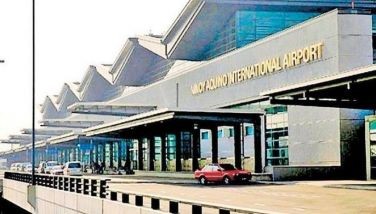RP bares major progress in free trade talks with Japan
October 31, 2004 | 12:00am
The Philippines on Friday reported significant progress in talks to sign a free-trade pact by the end of the year with Japan, its number-two export market, after a fifth round of negotiations here.
The hosts suggested there was significant movement on discussions on trade in goods except for sensitive agricultural products, while suggesting that certain issues on trade in services might take more time to resolve.
Chief Filipino negotiator Trade Undersecretary Thomas Aquino, said "significant progress was made at the conclusion of the fifth negotiation talks."
From fine-tuning of principles in the third round and a definition of interests and sensitivities in the fourth round, the fifth session "moves the negotiations to a more advanced stage that hopefully will pave the way for the closing of the deal," he added.
He gave no details on the specific items put on the table by either side, saying only that Manila continues "to aim at completion this year." More talks are planned here in November.
The Japanese panel, led by Deputy Foreign Minister Ichiro Fujisaki, did not speak to the press after the five-day session. But Aquino told a news conference he got the impression Tokyo was also keen to sign a free-trade deal within the year.
The Philippines, an agriculture-exporting nation, is seeking more access for its goods, particularly tropical farm products, to the world’s second largest economy and also wants its huge labor force to gain entry into the health care market for Japan’s graying population.
A Philippine government study showed an "economic partnership agreement" with Tokyo would boost Manila’s gross domestic product growth by between 1.73 and 3.03 percentage points.
Tokyo on the other hand wishes to clear hurdles to investment in the Philippines.
President Arroyo, speaking to reporters here on Monday, acknowledged that Japan’s nurses association are worried that Filipino nurses would take over their jobs.
"We are not interested in that," she said. "What we see as a big possibility are our care-givers and our IT (information technology) workers."
Segfredo Serrano, assistant secretary for agriculture in the Philippines, said the two panels had a "very frank exchange of views" on Tokyo’s relatively closed market for farm products, and were in a "delicate" stage of the talks on this segment of the market.
Japan is the Philippines’ second largest export market after the United States, with two-way trade totalling 13.41 billion dollars in calendar year 2003.
Philippine exports, consisting primarily of electronic products, automotive parts and components and bananas, amounted to 5.77 billion dollars last year. Japan shipped to Manila 7.64 billion dollars’ worth of goods, comprising mainly electronic products and automotive parts and components. – AFP
The hosts suggested there was significant movement on discussions on trade in goods except for sensitive agricultural products, while suggesting that certain issues on trade in services might take more time to resolve.
Chief Filipino negotiator Trade Undersecretary Thomas Aquino, said "significant progress was made at the conclusion of the fifth negotiation talks."
From fine-tuning of principles in the third round and a definition of interests and sensitivities in the fourth round, the fifth session "moves the negotiations to a more advanced stage that hopefully will pave the way for the closing of the deal," he added.
He gave no details on the specific items put on the table by either side, saying only that Manila continues "to aim at completion this year." More talks are planned here in November.
The Japanese panel, led by Deputy Foreign Minister Ichiro Fujisaki, did not speak to the press after the five-day session. But Aquino told a news conference he got the impression Tokyo was also keen to sign a free-trade deal within the year.
The Philippines, an agriculture-exporting nation, is seeking more access for its goods, particularly tropical farm products, to the world’s second largest economy and also wants its huge labor force to gain entry into the health care market for Japan’s graying population.
A Philippine government study showed an "economic partnership agreement" with Tokyo would boost Manila’s gross domestic product growth by between 1.73 and 3.03 percentage points.
Tokyo on the other hand wishes to clear hurdles to investment in the Philippines.
President Arroyo, speaking to reporters here on Monday, acknowledged that Japan’s nurses association are worried that Filipino nurses would take over their jobs.
"We are not interested in that," she said. "What we see as a big possibility are our care-givers and our IT (information technology) workers."
Segfredo Serrano, assistant secretary for agriculture in the Philippines, said the two panels had a "very frank exchange of views" on Tokyo’s relatively closed market for farm products, and were in a "delicate" stage of the talks on this segment of the market.
Japan is the Philippines’ second largest export market after the United States, with two-way trade totalling 13.41 billion dollars in calendar year 2003.
Philippine exports, consisting primarily of electronic products, automotive parts and components and bananas, amounted to 5.77 billion dollars last year. Japan shipped to Manila 7.64 billion dollars’ worth of goods, comprising mainly electronic products and automotive parts and components. – AFP
BrandSpace Articles
<
>
- Latest
- Trending
Trending
Latest






























